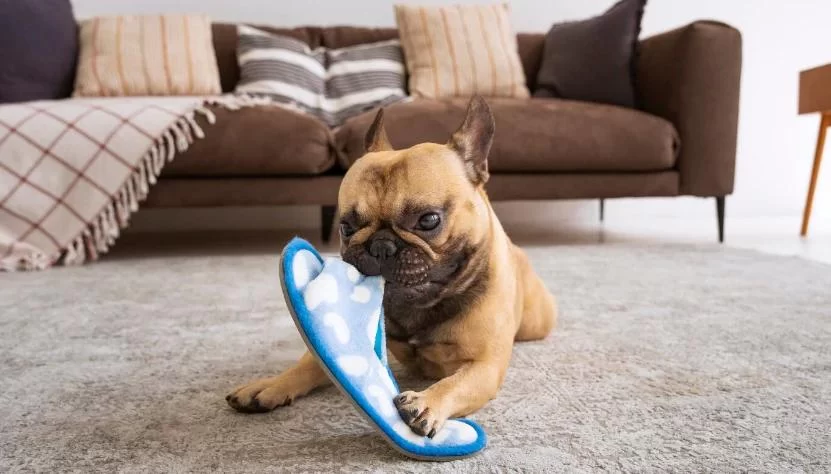- Understanding Dog Chewing Behavior
- Why Dogs Chew Shoes
- Strategies to Prevent Shoe Chewing
- Training Tips to Manage Chewing
- Real-Life Case Study: Overcoming Shoe Chewing
- Additional Support and Resources
1. Understanding Dog Chewing Behavior
Chewing is a natural behavior for dogs, serving multiple purposes such as exploring their environment, relieving stress, and soothing teething pain in puppies. However, when this chewing targets your shoes, it quickly becomes a frustrating issue for dog owners. Understanding why dogs engage in destructive chewing is the first step towards effectively addressing the problem.
1.1 The Role of Chewing in a Dog’s Life
From puppies to adult dogs, chewing helps maintain dental health and provides mental stimulation. Dogs also chew out of boredom or anxiety, which can become a habit if not addressed properly. Recognizing these triggers is crucial in preventing unwanted shoe destruction.
1.2 Common Triggers for Chewing Shoes
Shoes often carry human scent, making them particularly attractive to dogs. Additionally, shoes are usually left within easy reach, tempting dogs to chew when they feel anxious, under-stimulated, or simply curious.
2. Why Dogs Chew Shoes
Several factors contribute to shoe chewing, each requiring a slightly different approach to manage.
2.1 Puppy Teething
Much like human babies, puppies experience discomfort as their teeth develop, and chewing helps relieve this pain. Shoes are accessible and often satisfy the need for something chewy.
2.2 Separation Anxiety
Dogs left alone for long periods may chew shoes to cope with stress and anxiety. This behavior can escalate if not managed early.
2.3 Lack of Physical and Mental Stimulation
A bored dog is more likely to find shoes an appealing target. Ensuring your dog gets enough exercise and mental challenges can drastically reduce destructive chewing.
3. Strategies to Prevent Shoe Chewing
Effective prevention blends environment management, behavioral redirection, and positive reinforcement.
3.1 Environmental Management
Keep shoes out of reach by storing them in closets or using shoe racks with doors. Limiting your dog’s access to certain rooms can also help control the temptation.
3.2 Provide Appropriate Chew Toys
Offering a variety of chew toys encourages your dog to focus on acceptable items. Rotate toys regularly to maintain your dog’s interest.
3.3 Use Taste Deterrents
Products with bitter or unpleasant tastes can be sprayed on shoes to discourage chewing. While not a standalone solution, they are helpful when combined with training.
4. Training Tips to Manage Chewing
Training your dog to stop chewing shoes requires patience and consistency, combined with clear communication.
4.1 Positive Reinforcement
Reward your dog when they chew on approved toys instead of shoes. Treats, praise, and affection reinforce good behavior effectively.
4.2 Redirecting Behavior
When you catch your dog chewing a shoe, calmly redirect their attention to a chew toy. Avoid punishment as it may increase anxiety and worsen the behavior.
4.3 Increasing Physical and Mental Activity
Regular walks, play sessions, and puzzle toys reduce boredom and channel your dog’s energy into productive activities.
5. Real-Life Case Study: Overcoming Shoe Chewing
Consider Max, a young Labrador Retriever whose owner struggled with his shoe-chewing habit. After implementing a strict routine of environmental control, offering engaging chew toys, and daily exercise, Max’s chewing decreased significantly within a few weeks. The owner also used positive reinforcement consistently, rewarding Max when he chose toys over shoes.
This story highlights the importance of combining multiple strategies tailored to a dog’s unique needs. If you’re facing similar challenges, remember that patience and understanding are key to success.
6. Additional Support and Resources
If your dog’s chewing persists despite your best efforts, consulting professionals can provide personalized advice. At Hidden Brook Veterinary, expert guidance and a variety of recommended products can help you address destructive chewing effectively. Whether you need chew toys, training aids, or behavioral consultations, their services are designed to support you and your furry friend.
Investing in professional help early can save you time, frustration, and protect your home from further damage.












